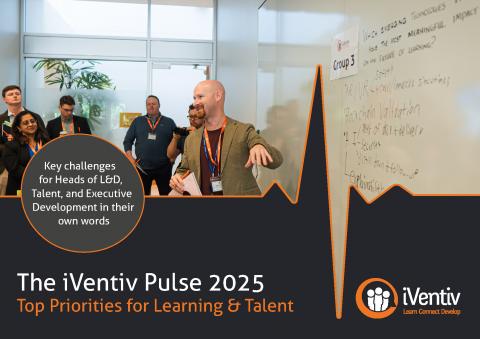Submitted by Kerry Summers on
Defining a Skills-Based Organisation at Zurich Insurance
At Zurich Insurance, a skills-based organisation prioritises the identification, development, and application of workforce skills to drive strategic business outcomes.
Adrian describes this model as the “secret ingredient” for Zurich's success, embedding skills across every facet of employee development, from learning programs and career progression to job design.
By focusing on skills as the foundation, Zurich aims to foster an agile, responsive, and resilient workforce ready to meet evolving market demands.
The Key Components of a Skills-Based Approach
For Zurich, creating a skills-based organisation required a robust framework built around several key components:
-
Comprehensive Skills Taxonomy
Adrian talks about how Zurich developed its own Global Skills Library to serve as the backbone of its skills-based approach. By building this taxonomy in-house and collaborating closely with internal job families, Zurich ensured that its skills library would be uniquely tailored to the organisation's roles and strategic objectives.
-
Custom Career Development Tools
Further, Zurich opted to design a proprietary career development tool instead of adopting a pre-existing solution. This in-house tool, Adrian tells us, integrates seamlessly with Zurich’s Learning Management System (LMS), mapping learning content to the skills in the library and ensuring employees can track their skill development effectively.
-
Data Analytics for Skill Tracking
Data analytics play a crucial role in Zurich's skills-based strategy, enabling Adrian's team to track skill development trajectories, identify gaps, and understand workforce capabilities. This data-driven insight helps Zurich make informed decisions about talent development, succession planning, and strategic workforce investments.
-
Comprehensive Change Management
A successful skills-based approach “goes beyond tools and frameworks”; it requires significant cultural change. Adrian explains that Zurich placed substantial effort into helping employees understand how these tools contribute to their personal and career growth. By rolling out the program gradually and engaging various business units individually, Zurich achieved higher adoption rates and fostered widespread organisational buy-in.
The Importance of Flexibility and Tailoring
A crucial element in Zurich's rollout was tailoring the approach to each business unit's unique context. Recognising that Zurich’s 40+ business units varied in size, geographical scope, and operational needs, Adrian's team collaborated closely with each unit to ensure the implementation would meet their specific requirements.
By adopting a flexible and tailored rollout strategy, Zurich maximised engagement and impact across diverse teams, reinforcing the ‘importance of adaptability’ in a skills-based transformation.
Investing in Skills-Based Development: The Business Case
Zurich’s journey to a skills-based model was driven by a clear business need. Adrian notes that employee engagement surveys had consistently highlighted gaps in career development and L&D support. Employees sought more “guidance and empowerment” over their career growth—a demand that resonated with Zurich’s vision of enabling employees to be “CEOs of their own careers.”
By investing in a skills-based framework, Zurich provided a streamlined, simplified approach that allows employees to track, develop, and apply their skills, ultimately enhancing both individual and organisational outcomes.
The Role of Skills in Empowering Employees
One of the standout benefits of Zurich’s skills-based approach is how it empowers employees to take ownership of their career development. The skills framework and development tools provide clarity on skill requirements for various roles, allowing employees to assess their capabilities and map out their career progression. This, Adrian tells us, empowers Zurich’s workforce to set personal development goals, enhancing engagement and satisfaction.
Adrian also highlights how Zurich’s approach fosters a culture of upskilling and reskilling, which is essential in today’s fast-evolving business environment. By clearly defining skills and aligning them with roles, Zurich enables employees to “understand what upskilling and reskilling mean in practical terms”, encouraging continuous personal and professional growth.
Implementing a Skills-Based Model: Where to Start
For other organisations looking to adopt a skills-based approach, Adrian advises starting small and strategically. Here are his recommendations:
1. Find a Senior Ally in the Business
Identifying a senior leader who understands and supports the vision is essential. This leader can advocate for the skills-based approach at executive meetings, ensuring alignment with organisational priorities.
2. Engage a Pilot Group
Start with a pilot group that has the enthusiasm and energy to co-create and refine the skills-based model. A successful pilot can serve as a proof of concept, inspiring other teams to participate.
3. Focus on Stakeholder Engagement
Skills-based transformation requires support from all levels of the organisation. Effective stakeholder management ensures that leaders, managers, and employees are aligned with the vision and committed to its success.
4. Leverage AI and Learning Technologies
Adrian recommends investing in AI-enabled technologies that support learning and skills development. Advanced tools can provide personalised learning paths, helping employees track and expand their skillsets efficiently.
5. Promote a Learning Culture
Finally, fostering a strong learning culture is critical. Without a commitment to continuous learning, even the most advanced skills-based models will struggle to gain traction. At Zurich, promoting learning is seen as a continuous journey, emphasising that a skills-based approach is an ongoing commitment, not a one-time initiative.
Final Thoughts: The Future of Skills as Organisational Currency
In today’s digital economy, skills are emerging as the new currency of competitive advantage. Zurich’s skills-based approach reflects this shift, as the organisation views skills as assets that drive performance, innovation, and resilience. By investing in skill development, Zurich has positioned itself as an agile, future-ready organisation where employees are “empowered to steer their own careers.”
As Adrian eloquently puts it, Zurich’s approach to skills is about creating “currency for the future.” By embedding skills across every level of the organisation, Zurich enables its workforce to remain relevant and impactful in a rapidly changing landscape. For Chief Learning Officers and Heads of Talent, Zurich’s journey underscores the importance of building a strong skills-based foundation, not just as a learning initiative but as a cornerstone of business strategy.
A skills-based organisation offers a strategic way forward for businesses seeking to navigate today’s complex environment. With the right foundation, stakeholder engagement, and cultural alignment, organisations can create a sustainable, scalable skills model that empowers employees and drives long-term success.
Frequently Asked Questions
What is a skills-based organisation, and how does Zurich Insurance define it?
A skills-based organisation prioritises the identification, development, and application of workforce skills to drive strategic business outcomes. At Zurich Insurance, this model is embedded across all aspects of employee development, such as learning programmes, career progression, and job design, fostering agility, resilience, and responsiveness.
Why does Zurich consider skills the “currency of the future”?
In the digital economy, skills drive performance, innovation, and resilience. By embedding skills into every organisational level, Zurich positions its workforce to remain relevant and impactful, ensuring sustainable competitive advantage.
Where should organisations start with a skills-based approach?
Adrian suggests:
- Finding a senior ally to champion the initiative
- Engaging a pilot group to test and refine the model
- Prioritising stakeholder engagement at all levels
- Leveraging AI and learning technologies for personalised development
- Promoting a strong, ongoing learning culture
How does Zurich empower employees through its skills-based framework?
The framework provides clarity on skills needed for different roles, enabling employees to assess their capabilities, set personal goals, and map career progression. This fosters engagement, satisfaction, and a culture of continuous upskilling and reskilling.
What are the key components of a skills-based framework?
Zurich's framework includes:
- Comprehensive Skills Taxonomy: A Global Skills Library tailored to Zurich’s roles and strategic goals
- Custom Career Development Tools: An in-house tool linked to the Learning Management System (LMS)
- Data Analytics: Tracking skills development, identifying gaps, and making informed workforce decisions
- Comprehensive Change Management: Ensuring cultural alignment and gradual programme rollout











